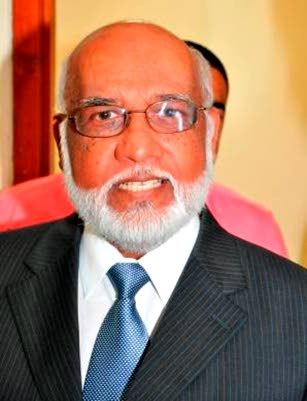Mohammed: National security a concern when repatriating Trinis from Syria

FORMER Speaker Nizam Mohammed, who met with the Prime Minister on Monday to discuss repatriating nationals trapped in conflict zones, said the thought of their returning radicalised is an issue that the National Security Council is mulling over.
Speaking with Newsday on Tuesday about the meeting, Mohammed said the matter was time-sensitive and needed a diplomatic approach.
Asked whether concerns were raised that the nationals would return radicalised or expose others to radical ideas, Mohammed said: “That will always be a concern.
"It will always be a major consideration at the national level when it comes to national security. It is an integral part of the process. It is unavoidable and totally and wholly, very necessary to be considered within the scheme of things.”
Dr Rowley chaired the meeting, which was attended by Mohammed, Kwasi Atiba, a member of the Islamic Resource Society, and retired diplomat Patrick Edwards, at Whitehall.
According to Human Rights Watch (HRW), there are almost 100 nationals detained in north-east Syria, with 56 children and 21 women held in two camps, and 13 males, including a teenage boy, in detention centres. The group is championing the call for repatriation of all those stuck in campsrun by US-backed, Kurdish-led forces, as a matter of urgency.
HRW said a survey showed over 100 children worldwide repatriated to their home countries had reintegrated into their societies well.
Last year, Sunday Newsday reported that after the collapse of the terrorist group ISIS, TT citizens were among over 50,000 people at al-Hol who were detained by the US-backed Syrian Democratic Forces (SDF), an alliance of Kurdish and Arab militias.
Most of the men who left the country to join ISIS died. Those who survived were taken to Syria and Iraq, along with women and children. There are 73 children – 38 from TT, 31 born in Syria, and four in Iraq – at the al-Hol, al-Hawl and al-Roj camps, There are also orphans.
Mohammed said the condition of the camps was not fully known, but for Muslims, the treatment of their women and children is very important to the community, who are taking a keen interestr.
Mohammed said he and his group had not confirmed the number of people stranded in the war zone. He added that while there were rumours, there was also no confirmation that any children were born while their mothers were held in camps.
Mohammed said the camps were in Syria but overseen by Turkish forces, so both Syria and Turkey would have to be engaged. He therefore called for patience, as no time frame was given to bring the stranded nationals back home.
“This is an extremely sensitive matter of international dimension, and we have to treat it as such. We have all agreed that as we move forward we may have to seek co-operation and assistance from other foreign governments and agencies.”
There will be a need for verification and identification exercises, Mohammed said, so when the repatriation takes place there will be some level of comfort to all.
“Given the volatility of the situation, we are unable, at this stage, to give any time frame. But we are hoping that, in a short period of time, we would be able to provide the public with something that could be regarded as substantial.”
He added: “We are hoping that we will get the co-operation of the public in general, because this is definitely a humanitarian crisis that we are handling at the moment.”


Comments
"Mohammed: National security a concern when repatriating Trinis from Syria"